Key takeaways:
- Ethical gift-giving emphasizes the values and stories behind gifts, enhancing their meaning and fostering connections.
- Feminist fashion challenges traditional norms and promotes inclusivity, allowing individuals to express their identities and support social causes.
- Conscious consumerism encourages informed purchasing that aligns with personal values, supporting ethical brands and combating fast fashion.
- Personalizing gifts and supporting women artisans enriches the gifting experience and empowers communities through meaningful connections.
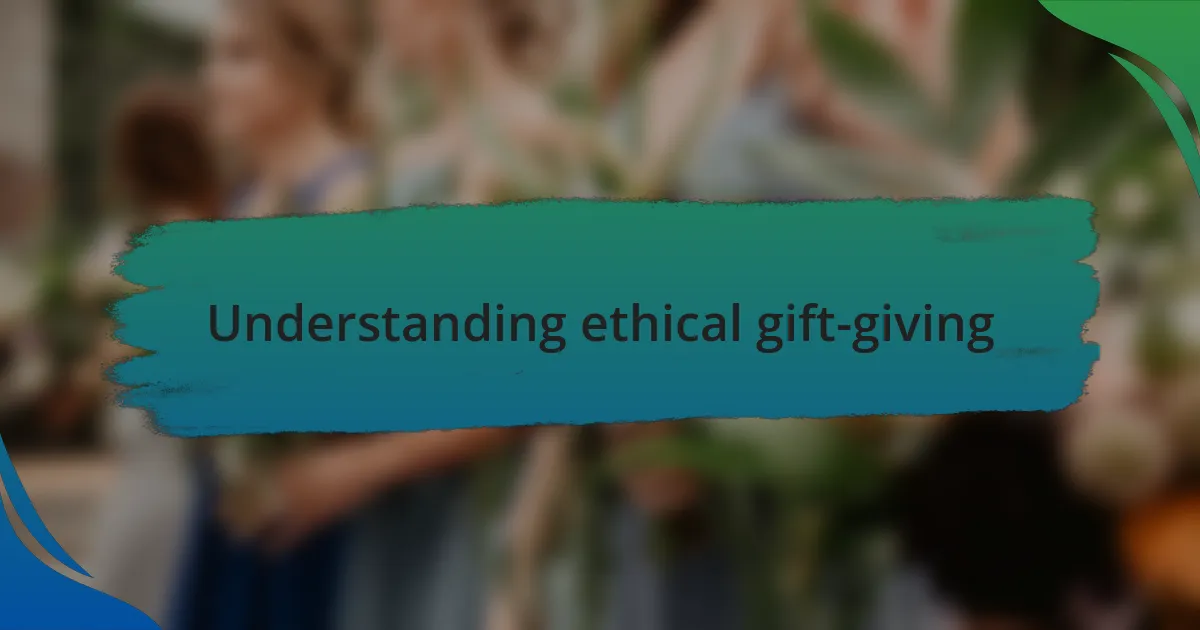
Understanding ethical gift-giving
Ethical gift-giving goes beyond the act itself; it’s about the intentions and values behind it. I remember a time when I gifted a handmade scarf to a friend, knowing that it was produced by artisans fairly paid in a cooperative. It wasn’t just a piece of fabric; it carried the story of its makers, and that connection added a deeper meaning to the gift.
Consider the environmental impact of your choices as well. Have you ever thought about the journey a product takes before it reaches the recipient? A few years ago, I decided to give up mass-produced gifts in favor of items that were sustainably sourced. This shift not only made my gifts more thoughtful but also sparked meaningful conversations about sustainability when I presented them.
Understanding ethical gift-giving means recognizing the power of our purchases. I often find myself questioning whether a gift truly reflects my values and those of the person receiving it. This awareness not only enriches the gift-giving experience but often leads to more fulfilling relationships, where each gift becomes a shared expression of care and respect.
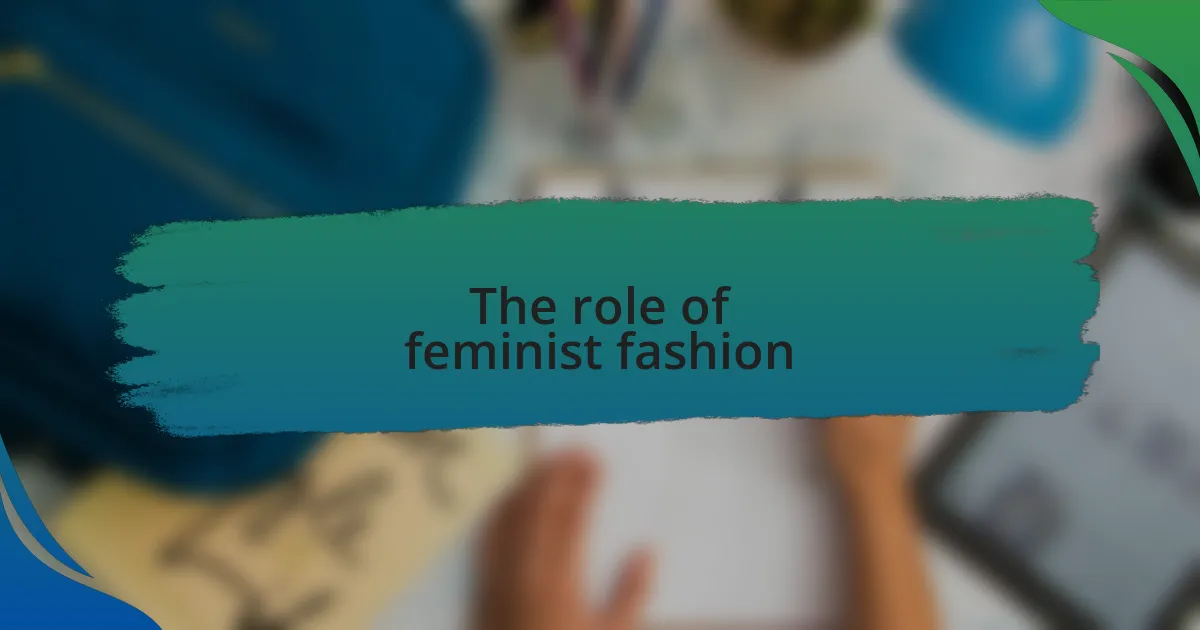
The role of feminist fashion
Feminist fashion plays a unique role in challenging the status quo of how we perceive clothing and identity. I vividly recall attending a local artisan fair where I discovered a clothing line designed by women, aimed at empowering them through both style and ownership. Each piece was not just fashion; it was a statement against the traditional narratives that often confine women’s roles in society, sparking discussions about autonomy and self-expression.
At the heart of feminist fashion is the idea of inclusivity. I often find myself pondering how the fashion industry has historically marginalized certain bodies, voices, and stories. When I see brands that celebrate diverse body types and cultures, it gives me a sense of hope. It reinforces the belief that every individual deserves to feel beautiful and empowered, regardless of societal standards.
Moreover, feminist fashion isn’t merely about aesthetics; it intertwines personal values with political statements. I recall wearing a T-shirt emblazoned with a powerful message at a women’s rights march. It wasn’t just clothing; it was my way of communicating solidarity and encouraging dialogue on critical issues. This blending of fashion with activism has the potential to transform how we perceive not only what we wear but also the messages we share with the world.
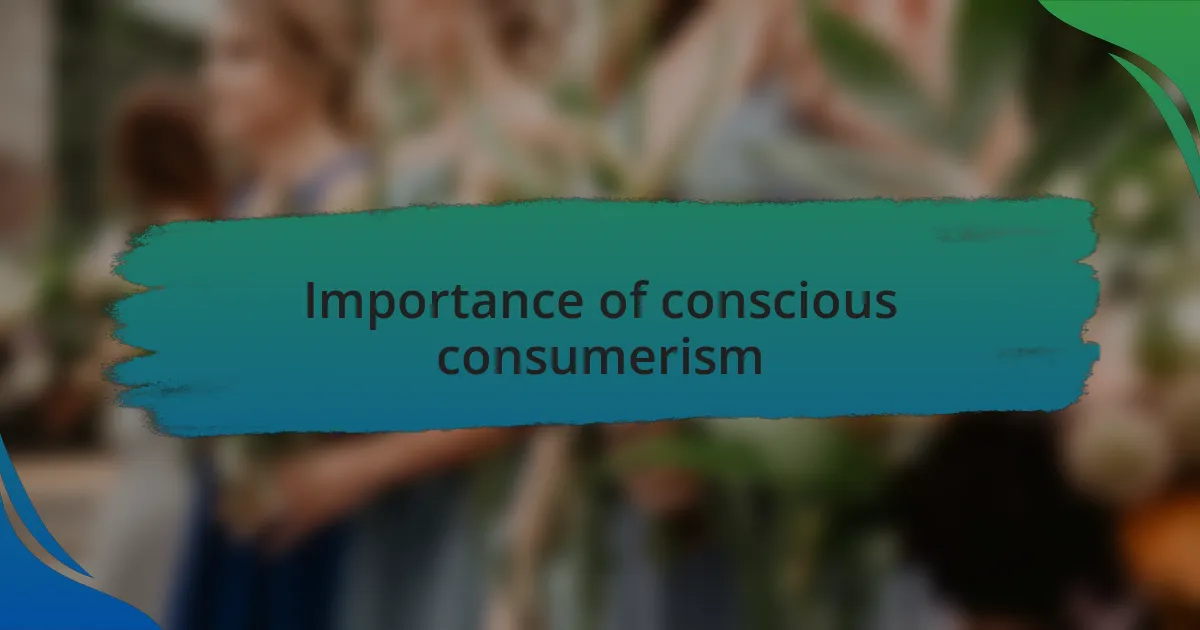
Importance of conscious consumerism
Conscious consumerism is crucial in today’s world as it allows us to make informed choices that reflect our values. I remember purchasing a handmade scarf from a local artisan, not just for its beauty but knowing that my money was directly supporting a woman’s craft instead of a faceless corporation. It hits me how every purchase carries a story, and by prioritizing ethical products, we can contribute to a more equitable economy.
When I reflect on my shopping habits, I often ask myself: are my choices in alignment with my beliefs? Each time I commit to supporting sustainable brands, I feel a sense of empowerment. It’s not just about the clothes I wear; it’s about standing in solidarity with communities that prioritize ethical practices. This mindset makes my fashion choices feel more meaningful and interconnected.
Embracing conscious consumerism also enables us to challenge fast fashion’s negative impact on both people and the planet. I remember the feeling of guilt that washed over me when I learned about the exploitation behind cheap clothing. This realization sparked my journey towards a more thoughtful approach to fashion. By choosing to buy less and invest in quality, I’ve found that my wardrobe is not only more personal but also a source of pride.
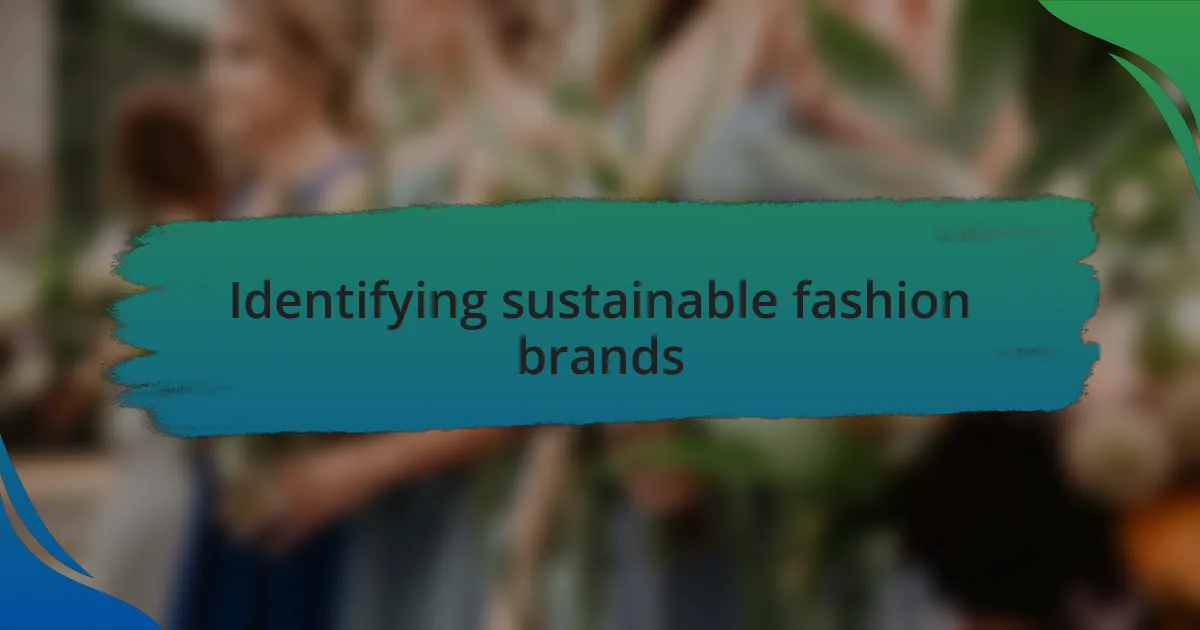
Identifying sustainable fashion brands
Identifying sustainable fashion brands can be a rewarding journey, yet it requires a discerning eye. I often start by looking for certifications like Fair Trade or GOTS (Global Organic Textile Standard), which assure me that the brand adheres to specific ethical standards. When I found a T-shirt labeled with GOTS certification, it felt like a small victory, knowing it was made with organic materials under fair labor practices.
Another aspect to consider is the brand’s transparency. I remember when I discovered a label that openly shared their production process online, including where their materials were sourced. This kind of honesty resonates with me—it’s a clear indicator they value their consumers and the environment. It makes me wonder, how many brands are willing to lay their cards on the table in the same way?
Beyond just labels and transparency, the story behind each brand can offer deeper insights into their sustainability efforts. I’ve been inspired by a small, woman-owned business that not only creates beautiful clothing but also supports local artisans in their community. Each garment carries a piece of someone’s story. Understanding these narratives makes my purchases feel more intentional and connected to a larger movement of conscious fashion.
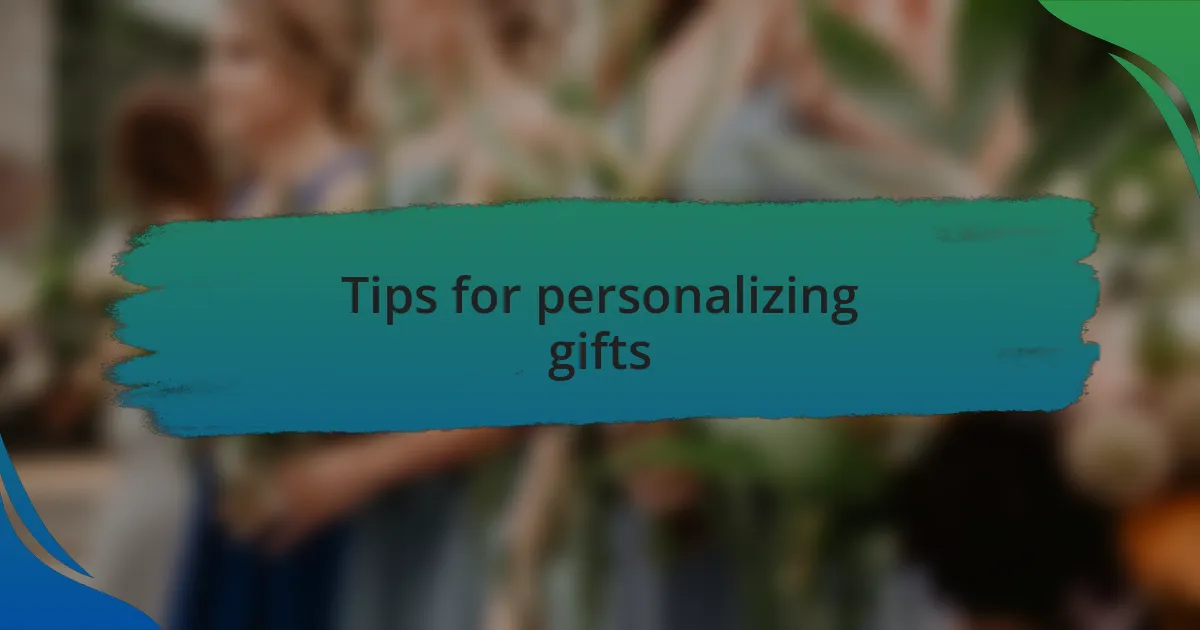
Tips for personalizing gifts
Personalizing a gift can transform it from a mere object into a meaningful gesture. One way I like to achieve this is by adding a handwritten note. I remember giving a friend a vintage scarf, and including a note about how it reminded me of our favorite café. The simple act of sharing a memory made the gift more special and reflected our bond.
Another approach is to consider the recipient’s hobbies or interests. When I crafted a birthday gift for a friend who loves gardening, I included some eco-friendly seed packets along with a unique handmade planter. It was amazing to see her face light up when she realized I had tailored the gift to her passion. It made me think: how often do we pay attention to what truly makes someone happy?
Lastly, I find that wrapping can enhance the personal touch. I often use fabric scraps or recycled paper for wrapping, tying them off with a ribbon. Not only does this reflect my commitment to sustainability, but it allows me to express creativity in a way that feels authentic. It’s like giving another layer to the gift itself—how can we elevate the experience of giving beyond the gift inside?
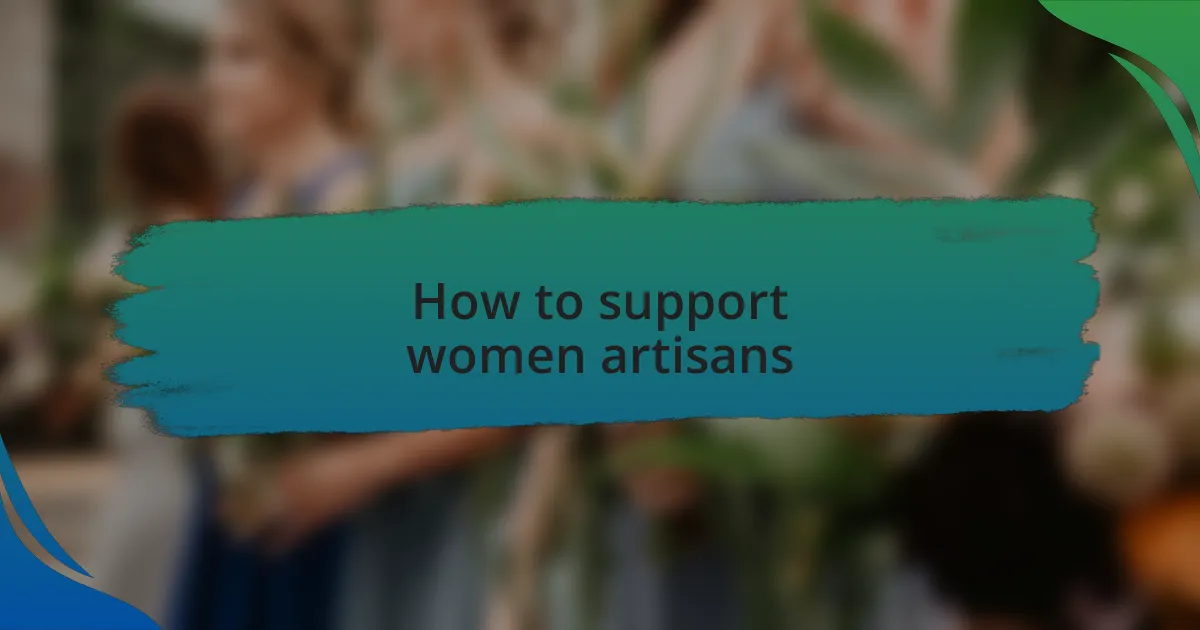
How to support women artisans
Supporting women artisans is a deeply fulfilling endeavor. I recall visiting a local craft fair where I struck up a conversation with a talented woman who created stunning pottery. Her story of perseverance and creativity inspired me, and purchasing her pieces not only enriched my home decor but also empowered her as an artist. Have you ever considered how your purchase could impact someone’s life?
Another compelling way to support women artisans is by sharing their work on social media. I once featured a women-led jewelry business on my platform, and the response was overwhelming. It reminded me that visibility can open doors, creating opportunities for those whose talents deserve recognition. Isn’t it fascinating how a simple share can amplify someone’s voice and reach?
I’ve found that attending workshops or classes taught by women artisans yields an enriching experience. Participating in a fabric-dyeing session with an incredible woman who had mastered traditional techniques helped me appreciate the artistry behind her creations. It’s amazing how learning directly from artisans connects us to their craft and story—how often do we engage with the makers behind the products we love?
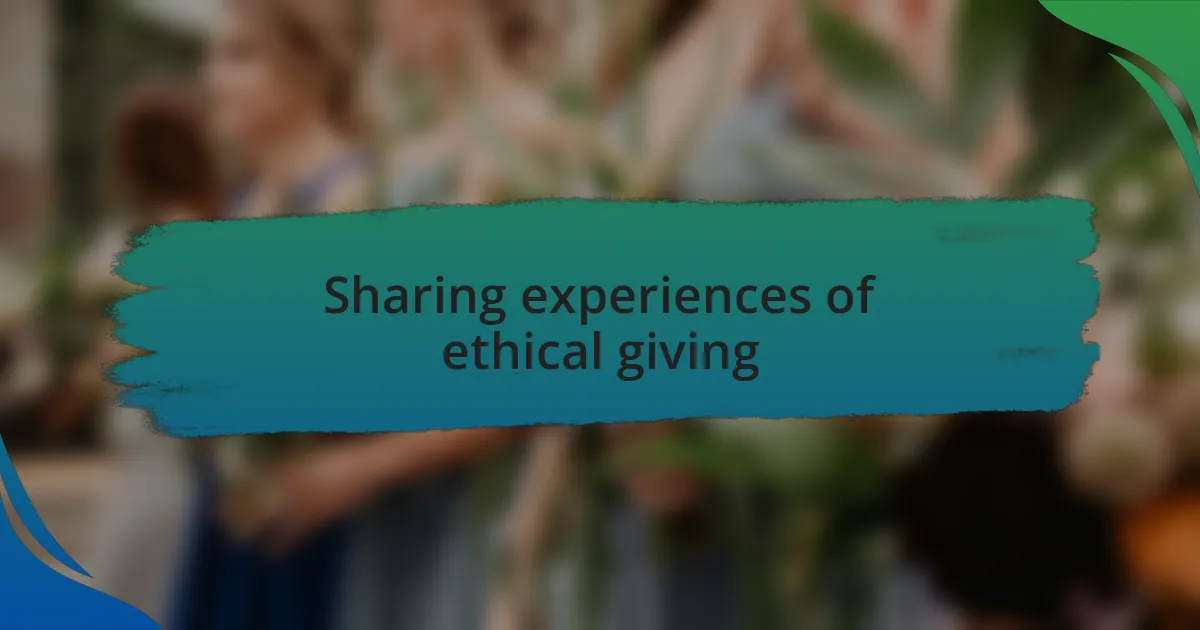
Sharing experiences of ethical giving
I remember the first time I gave an ethical gift to a close friend. I found a handmade scarf woven by a cooperative of women artisans from a marginalized community. The moment my friend unwrapped it, her eyes lit up, and I felt a surge of joy knowing that my choice not only brought her happiness but also supported women striving for independence. Isn’t it incredible how a single gift can weave together stories of empowerment?
One time, I attended a sustainable fashion pop-up market and engaged with various artisans. I saw a striking knitted handbag that caught my attention. The artisan shared her journey of turning her passion for knitting into a sustainable business that supports her family. That connection made my purchase feel like a collaboration rather than just a transaction. What moments have you experienced where a product connected you to its maker?
Sharing my journey with ethical gifting has also sparked conversations among my friends about mindful consumerism. On several occasions, I’ve hosted gift exchange parties where everyone brings locally made or fair-trade items. Hearing the stories behind each gift created a sense of community and responsibility. How often do our choices inspire others to think about their impact as well?